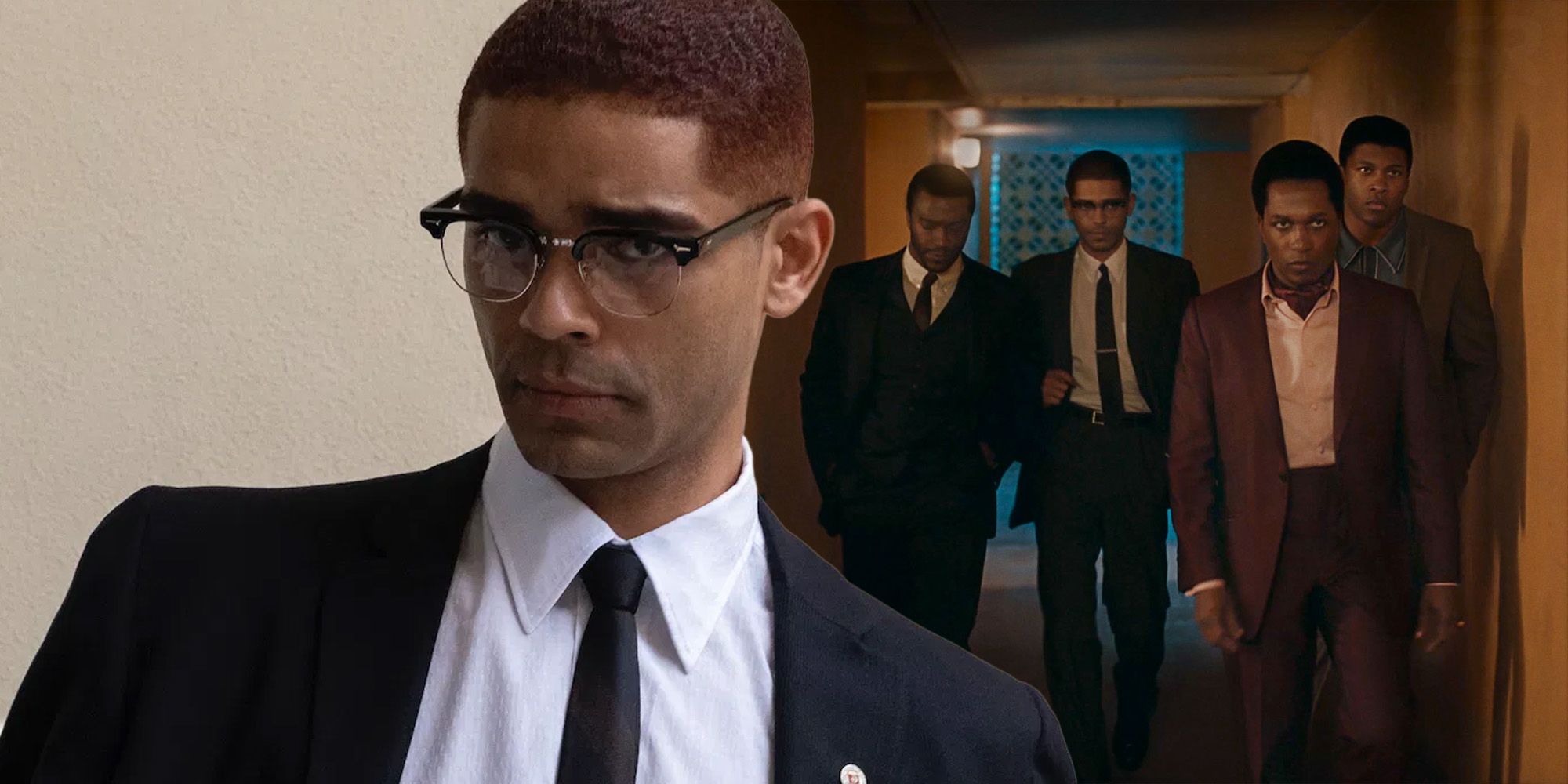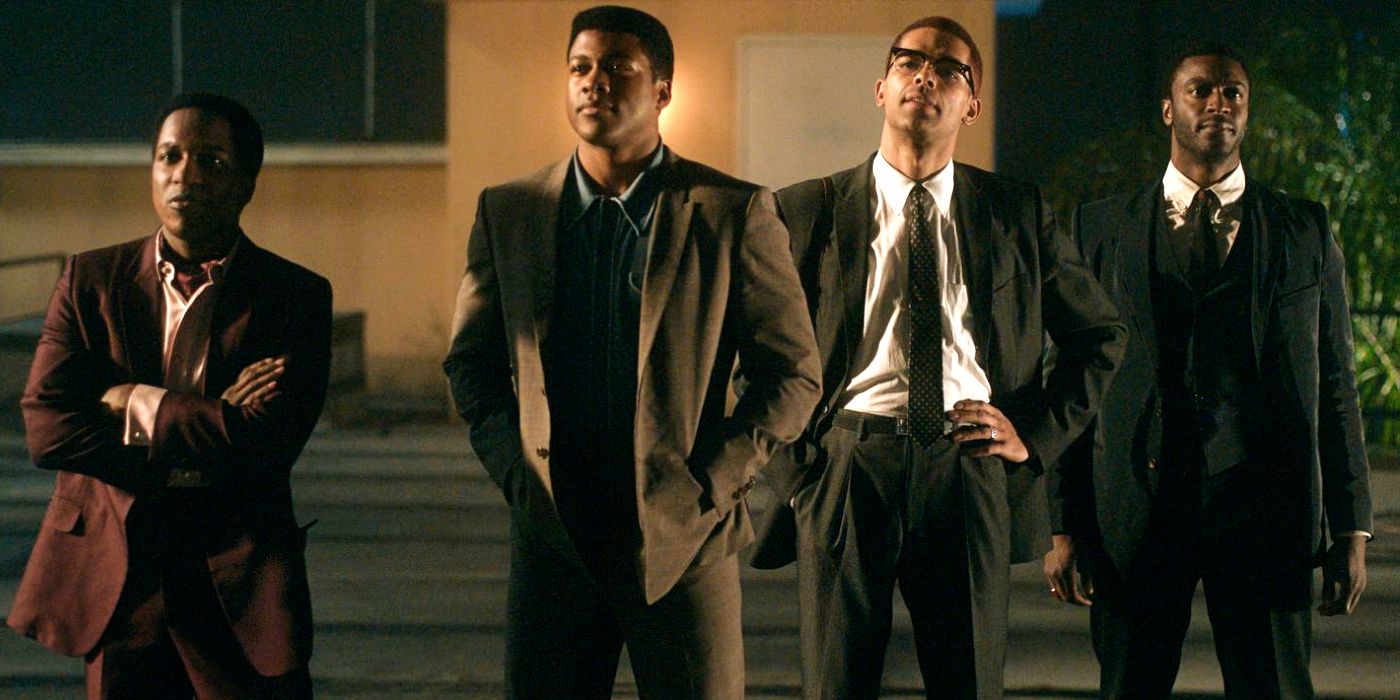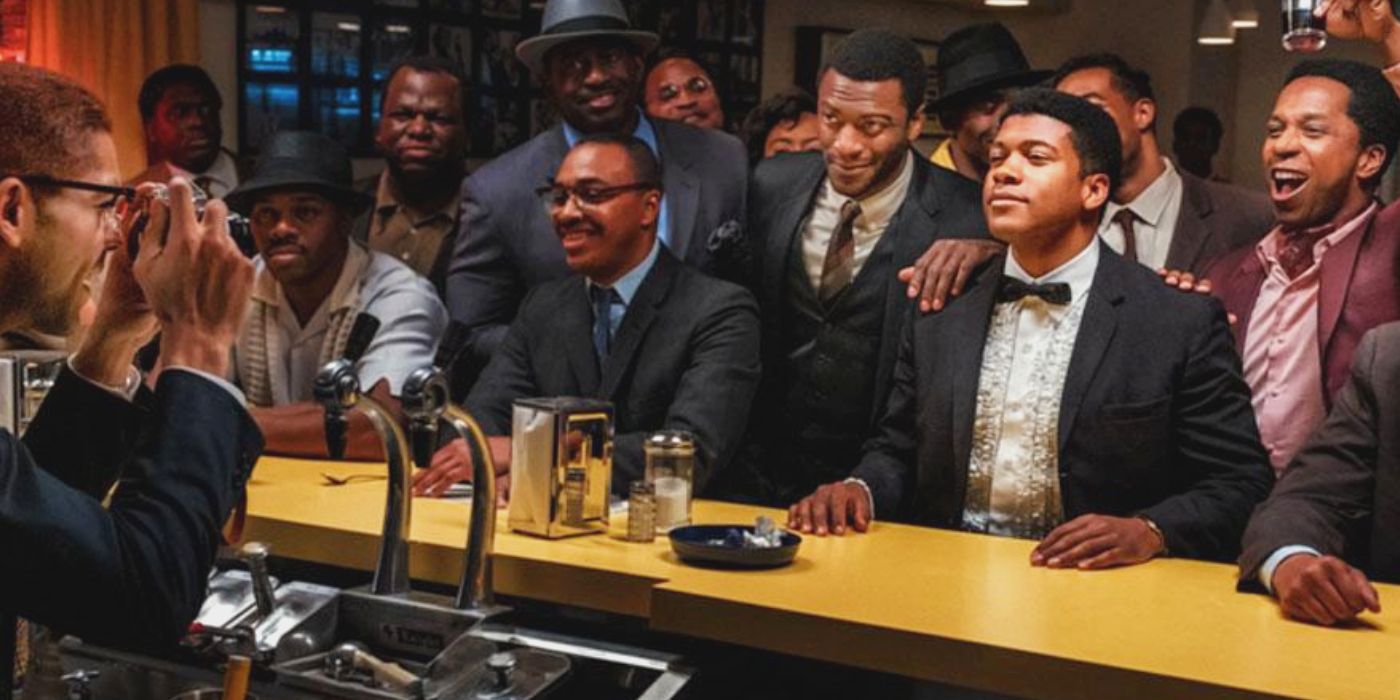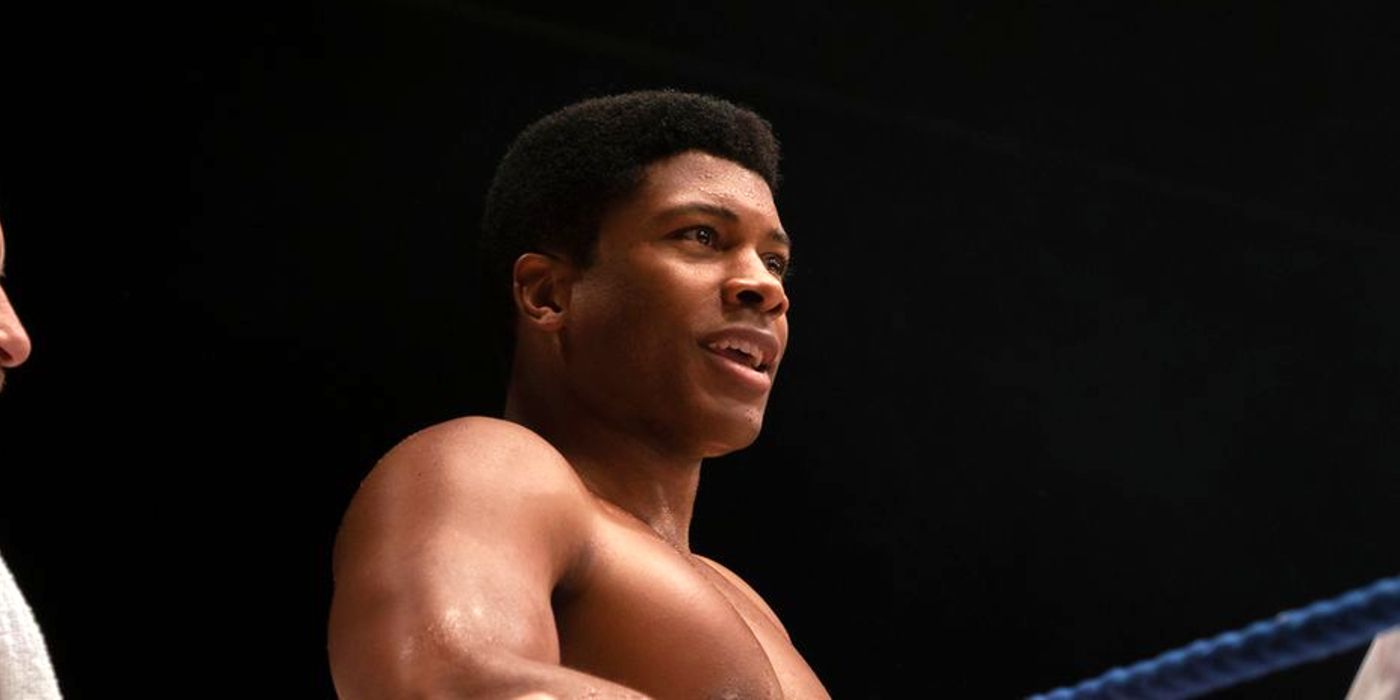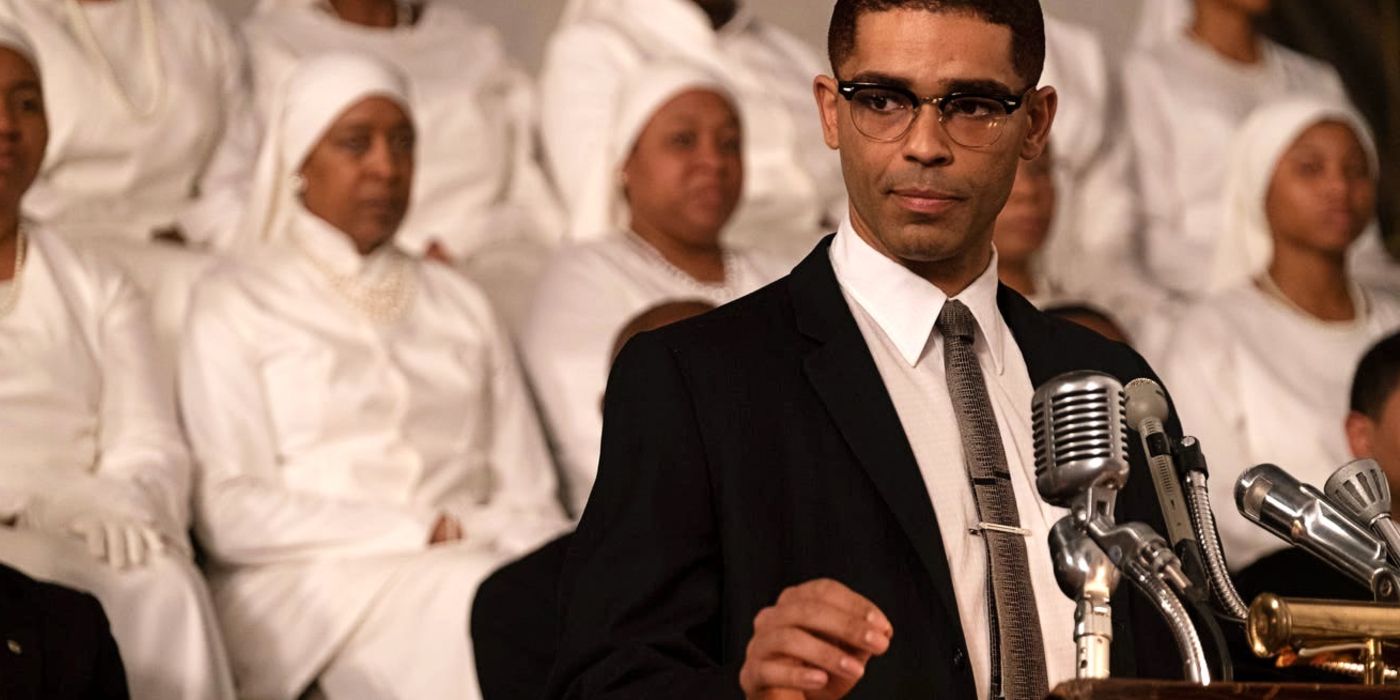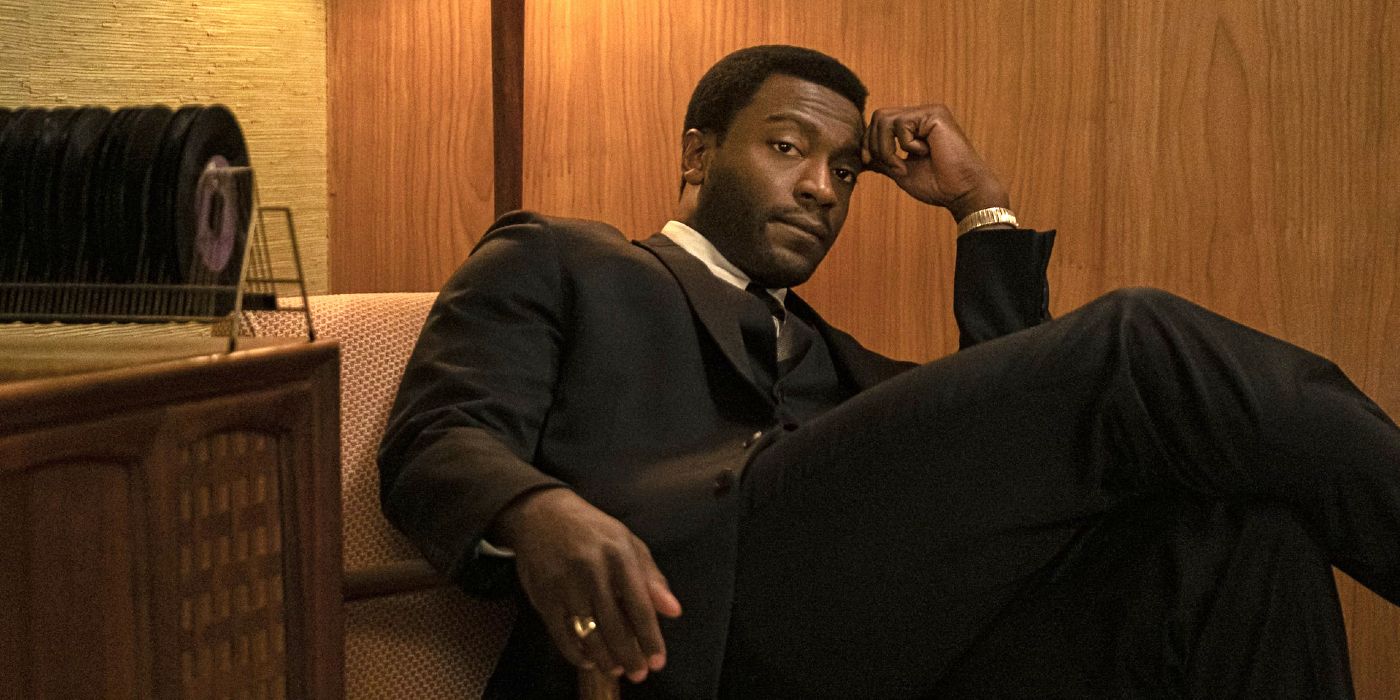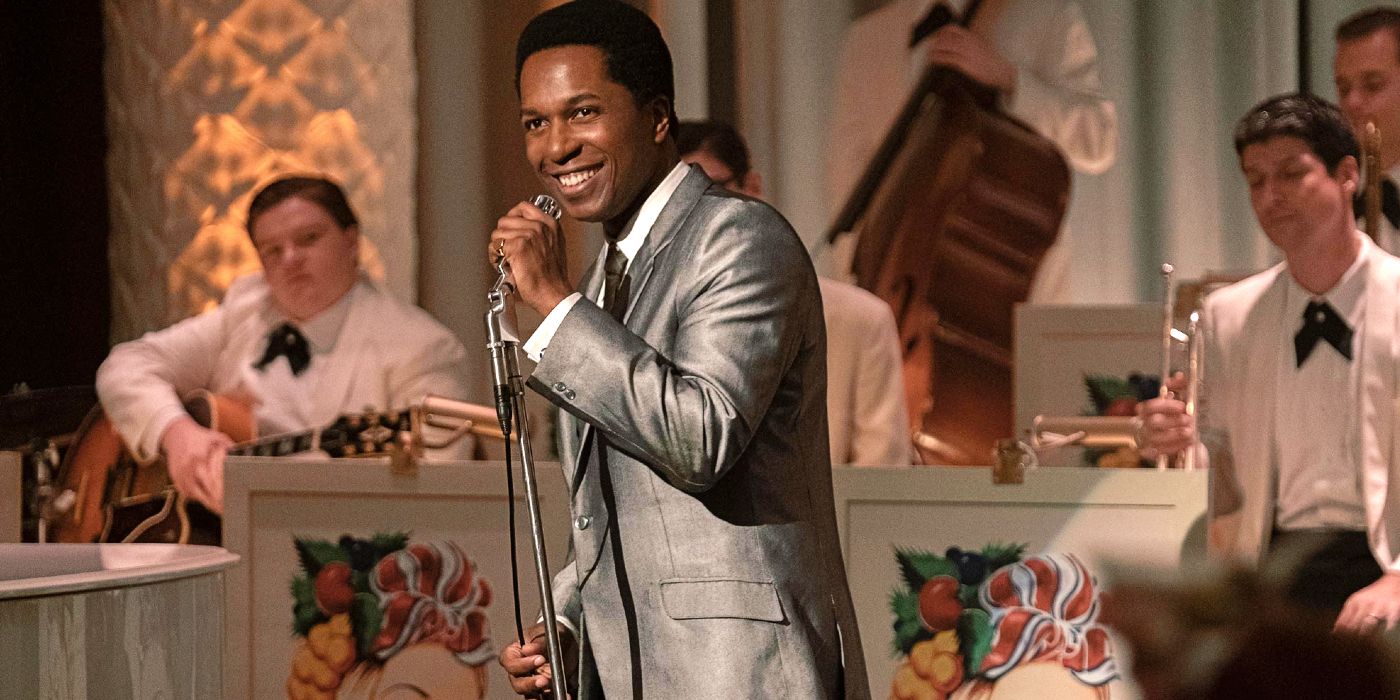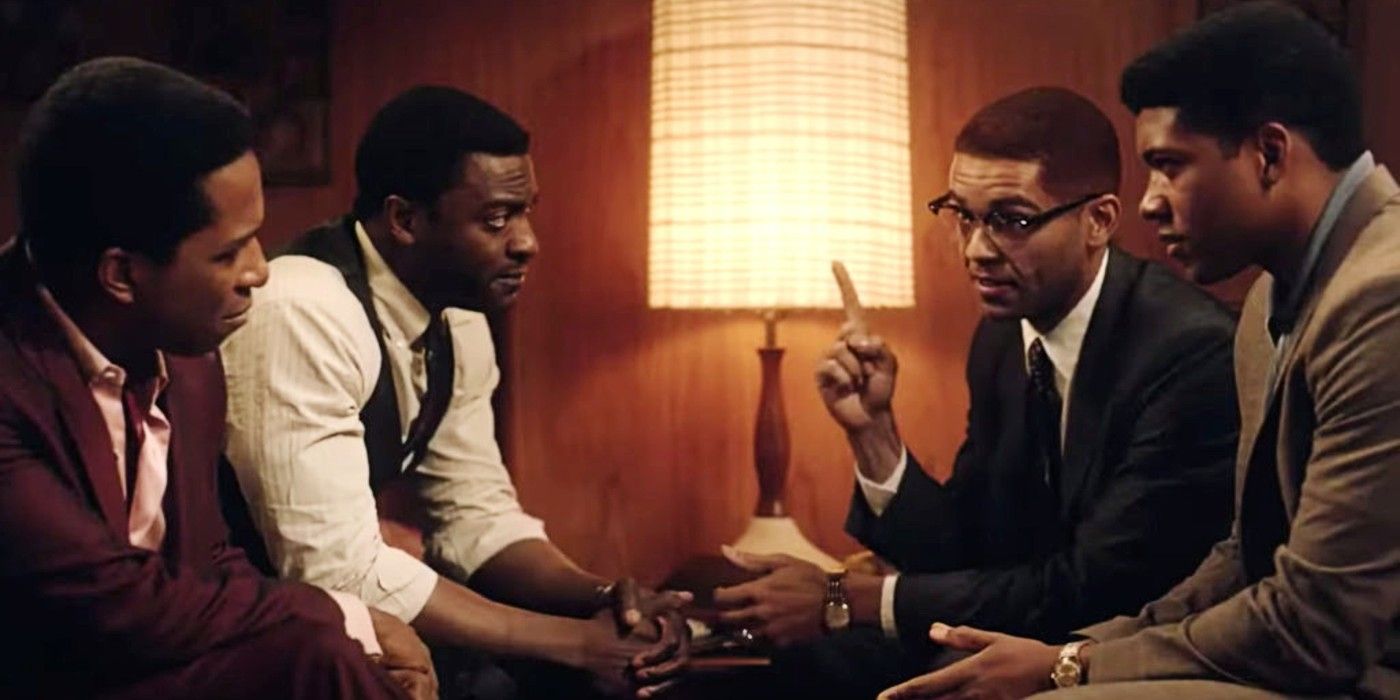Warning! Spoilers Ahead for One Night in Miami
Regina King’s feature directorial debut, One Night in Miami, ends on a note of hope, while dramatizing an event that altered the course of the Civil Rights Movement in America. One Night in Miami centers upon four historical stalwarts, namely Malcolm X (Kingsley Ben-Adir), Sam Cooke (Leslie Odom Jr.), Jim Brown (Aldis Hodge), and Muhammad Ali (Eli Goree), who meet up for a life-altering get-together at a hotel in Miami Beach, Florida. One Night in Miami is now available for streaming on Amazon Prime.
King’s film is based on Kemp Powers’ stage play of the same name, which is a 90-minute, one-act drama that pinpoints pivotal moments in the lives of the four men, still in their nascent stage in terms of potential. One Night in Miami dissects how these men are not afraid to challenge each other’s thoughts, views, and core beliefs regarding the present and future of Black America, along with the heinous racial injustice that runs rampant through American socio-political structures.
This sparks tense, charged conversations about race, identity, social responsibility, and integrity, leading to an intellectual tussle between Cook and Malcolm X, while Ali (who was born Cassius Clay) and Brown undergo inner turmoils of their own. Here’s an in-depth exploration into the variant themes discussed in the film, along with the significance of the ending, which is bittersweet, to say the least.
How Much Of One Night In Miami Really Happened
Cassius, Malcolm, Jim, and Sam were friends in real-life, and they did spend the night of February 25, 1964, together in Miami, celebrating Cassius’ historic win against Sonny Liston, leading to the former's victory in the World Heavyweight Championship. However, fragments of the narrative in One Night in Miami are scattered across history via various accounts, which are ultimately woven together into a debate-filled, epiphanic meet-up that is etched with the aid of historical research, nuanced character portraits, and creative dramatization. The brilliance of the film lies in the fact that none of the four figures are deified in any sense, but presented in a viscerally realistic light, replete with their vulnerabilities, fears, and ingrained prejudices.
As explained by King, One Night in Miami is a “love letter” to Black masculinity, which is often portrayed through a regressive and over-simplified lens. While all four characters are flawed in one way or another, they are intrinsically authentic, stripped to their soul, which only yearns for love, freedom, and the triumph of the oppressed. Although the conversations between the four men are either imagined or inspired by true events, the ending of One Night in Miami is rooted in reality, and the film touches upon the fates of Sam, Malcolm, Jim, and Muhammed Ali, and the impact each individual had on the civil rights movement.
One Night In Miami's Ending: What Happened Next
The aftermath of the events of February 25 is chronicled towards the end of the film, with Sam debuting his groundbreaking song, A Change Is Gonna Come, on The Tonight Show. Sam’s heartfelt piece brims with power and alters the cultural aspect of the civil rights movement, but he does not live to see the impact his art had on the world, as he was shot almost a year after the film’s events under mysterious circumstances. The same can be said of Malcolm, who - instead of being on The Tonight Show - was perenially on-the-move with his family after their home was firebombed by the Nation of Islam (NOI), a Black religiopolitical organization, in which Malcolm was the national spokesperson at the time. Malcolm's relationship with the NOI, and its leader, Elijah Muhammad, became especially fraught after he became disillusioned with the organization and its often-contradictory tenets.
Apart from this, Malcolm perpetually had a target on his back for his impassioned speeches that were viewed by the mainstream media as “hate-filled and segregationist”, and the film also hints that one of his trusted bodyguards was in cahoots with the FBI. A combination of these factors led Malcolm to become acutely aware that his days were numbered, as a result of which, he poured his attention into writing his autobiography, whose publication he, unfortunately, did not live to see, as he was assassinated on February 21, 1965. On the other hand, Jim decides to quit his NFL career and pursue acting, going on to star in movies like Mars Attacks! and The Running Man. Meanwhile, Cassius assumes the name Muhammad Ali, and parts ways with Malcolm X, his friend and spiritual mentor, which he later stated as one of the greatest regrets in his life. Ali remained unafraid of expressing his identity over the years that followed, going on to proclaim:
“I am America. I am the part you won't recognize. But get used to me. Black, confident, cocky; my name, not yours; my religion, not yours; my goals, my own; get used to me.”
Why Cassius Clay Changes His Name To Muhammad Ali (& Breaks From Malcolm X)
Cassius met Malcolm during a Savior's Day rally hosted by the NOI in Chicago, wherein the former was mesmerized by Malcolm's passionate rhetoric and sharp, witty, remarks to the press. The two formed a close friendship, and in turn, Malcolm recognized Cassius's unbridled potential as a professional boxer and a charismatic figure, hoping that he could draw him into the Nation and provide him with a spiritual home, as Cassius had rejected the faith he had grown up in. It is during the events of One Night in Miami that Malcolm wishes Cassius to go public with his decision to transition to the NOI, while he himself planned to break away from the organization and start his own. The Nation of Islam was often criticized by civil rights activists such as Martin Luther King and Floyd Patterson, as the organization often posited segregationist views with its staunchly anti-white ideology, which made Cassius' transition, being the rising sportsman he was at the time, more controversial than ever.
On February 26, while Cassius publicly declared his affiliation with the NOI, Malcolm was declared persona non grata by the Nation soon after, as he had publicly exposed Elijah Muhammad's indiscretions. Meanwhile, on March 6, Elijah Muhammad gave a radio address that Cassius would be renamed Muhammad Ali, symbolizing the rejection of his self-proclaimed "slave name" that he did not have a choice over, and the unbridled avowal of his identity as a Black Muslim. Ali was named after the white politician and emancipationist, Cassius Marcellus Clay, who, despite his abolitionist fervor, owned more slaves after the 13th Constitutional Amendment. It is important to note that Ali's decision to change his name stemmed from the fact that he was directly influenced by Malcolm X, who inspired strong commitment and belief in him. Now armed with an identity he could claim as his own, Ali rose up the ranks of the organization. However, by this time, the schism between Malcolm and NOI was complete, which was viewed by Ali as an act of disloyalty against the organization and his core beliefs as a Black Muslim.
The bone of contention between the two men lied in the fact that Malcolm wanted Ali to leave NOI and go with him, while the latter was too inextricably associated with the Nation at the time, hence, in a way, turned his back on his friend and mentor. One Night in Miami contextualizes this tussle, adding more meaning to it by showcasing the deep brotherly bond between the two characters. This positions their separation as deeply tragic, especially when one considers that Ali does not get the chance to mend his friendship with Malcolm, as the latter would be assassinated by members of the Nation of Islam a year after the events of the film.
Malcolm X's Death & Ending Quote Explained
One Night in Miami explores Malcolm's deepest fears and inner desires, positioning him as a man deeply concerned about the state of the civil rights movement, which is the primary reason behind the tense arguments between him and Sam. Malcolm expresses how deeply uncomfortable he is with Sam’s “lack of political commitment” and excoriates him for indulging white audiences with love songs imbued with no depth or meaning. The events of the film reveal that Sam is partially inspired by Malcolm X to write A Change Is Gonna Come, and the screen fades to black after concluding with a quote from the activist, spoken two days before his tragic demise: “It is a time for martyrs now, and if I am to be one, it will be for the cause of brotherhood. That's the only thing that can save this country.”
Malcolm's quote showcases an acute awareness of his numbered days, with the NOI firebombing his home and the FBI covertly tracing his whereabouts, along with his innate need to pass on the torch before his inevitable demise, which is exactly what he does through his conversations with Sam, Jim, and Cassius in One Night in Miami. Malcolm's last words are imbued with immortal power, inspiring generations to come with its message of integration and brotherhood, which is in stark contrast to his revolutionary persona when he was associated with the Nation.
The film adds greater depth to Malcolm's words, which hint at the fact that he had reached a turning point in his life, which spurred him to approach a middle ground in terms of race relations and embrace a more universal vision of brotherhood. The murder of Malcolm X had an indelible impact on the Black Nationalist movement, but his words, in conjunction with his actions, inspired countless individuals. The 2020 Netflix docuseries, Who Killed Malcolm X? offers a thorough account of the socio-political circumstances that led up to his death and the understated role of US law enforcement officials in the incident.
Why Jim Brown Retires Early From The NFL
Jim Brown as a fullback for the Cleveland Browns of the NFL from 1957 through 1965, and was considered one of the greatest running backs of all time. Despite a promising and already-brilliant career, Brown quit the NFL after the Cleveland Browns owner, Art Modell, pressurized him into putting his movie career on hold, which only pushed him in his decision to retire. One Night in Miami explores Jim's innate desire to become a Hollywood star, through his conversation with Cassius about his debut role as a cavalry soldier in the 1964 Western, Rio Conchos.
The film also posits that apart from the tensions between him and Modell, Jim's decision to pursue acting full-time was inspired by the events of February 25, especially Sam's views of bringing social change through art and altering the fabric of the system from within. This speculation holds merit, as in a letter written to Modell a few days prior to his retirement, Jim states that his decision is final, as it is a future that he truly desires and deems best for himself and his race. The ending showcases his retirement announcement on the set of The Dirty Dozen, which went on to become a commercial success, landing him in major roles throughout his cinematic career.
Sam Cooke's Final Song: What "A Change Is Gonna Come" Means
Since its release, Sam Cooke's A Change is Gonna Come became an anthem for the civil rights movement, along with an epitaph for a trailblazing performer. As One Night in Miami shows Sam publicly debuting his song, the camera cuts to Malcolm watching his performance on television, harboring a sense of quiet pride for his friend, who finally decides to make a departure from his signature style, and offer hope to the movement through his art. A Change is Gonna Come is an eloquent depiction of triumph over adversity, inspired by Bob Dylan's 1963 protest piece, Blowin' in the Wind, which audiences see Malcolm play in order to encourage Sam in that direction.
Sam's desire to make a political statement through his song is imbued with a new sense of urgency, as exemplified in the lines: “I go to the movies and I go downtown/But somebody keeps telling me, don’t hang around”, which is an undeniable reference to the constant threat and ostracization faced by the Black community, especially during the enforcement of the Jim Crow laws. Sam's pertinent message is infused with renewed meaning after his tragic murder at the Hacienda Hotel in downtown Los Angeles, resulting in a legacy of a powerful Black voice that was cut short before its prime but went on to instill much-needed hope during times of strife and adversity.
What One Night In Miami's Ending Really Means
The ending of One Night in Miami is undoubtedly tragic, but laced with a glimmer of hope, due to the fact that despite the deaths of Sam and Malcolm, their legacies had an indelible impact on the civil rights movement and Black history as a whole, inspiring countless individuals to step up to the cause when required. Apart from this, the ending also raises key questions regarding the role that art, inter-personal relationships, and identity plays in the shaping of figures who go down in history as harbingers of change. The conversations between the four men within the confined hotel room evokes strong emotions, especially when Malcolm echoes the current racial climate in America:
“There is no more room for anyone to be standing on the fence anymore. Our people are literally dying on the streets every day! Black people are dying! Every day! A line has to be drawn in the sand, Jimmy.”
The ending of One Night in Miami serves to highlight the undeniable role played by the night of February 25, as it marked a turning point for all four men in question, who went about divergent ways while working towards a united cause. After the screen fades to black, the audience hears Leslie Odom Jr.’s own artistic creation, a song, which undoubtedly stems from the urge to reclaim freedom and social justice for his community, echoing Bertold Brecht’s memorable lines on the power of art to bring about true change:
“In the dark times, will there also be singing? Yes, there will also be singing. About the dark times.”

